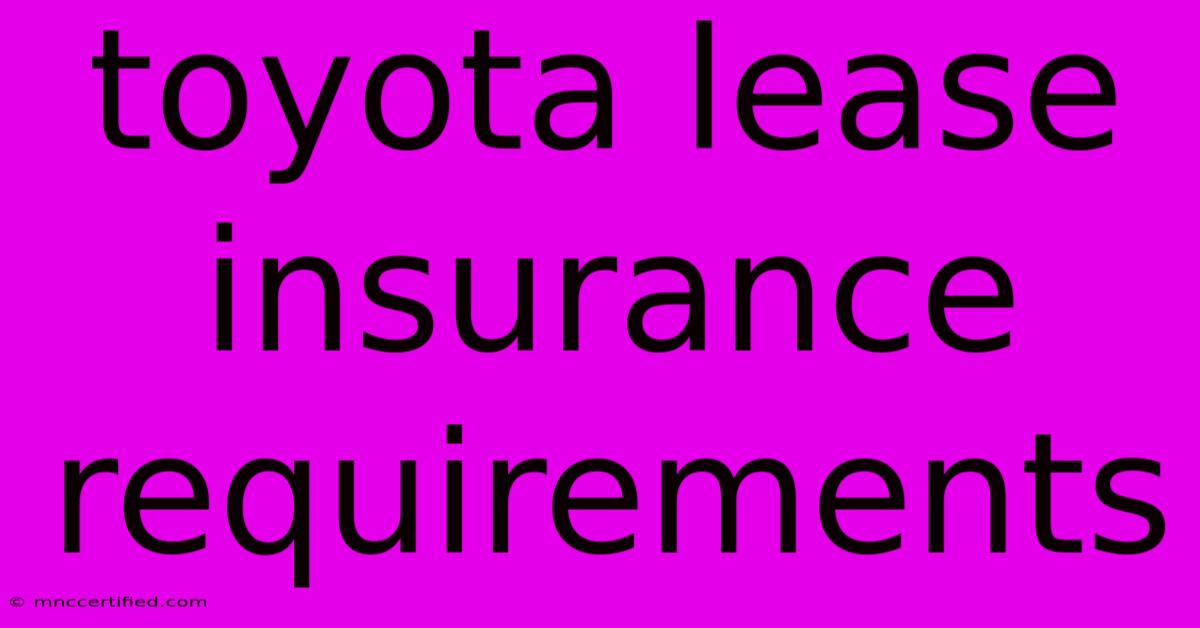Toyota Lease Insurance Requirements

Table of Contents
Demystifying Toyota Lease Insurance Requirements: A Comprehensive Guide
Thinking about leasing a Toyota? It's a great option, but understanding the insurance requirements is crucial before signing on the dotted line. This guide will break down everything you need to know about Toyota lease insurance, ensuring you're fully prepared for the process.
Understanding the Basics: Why Insurance Matters
Toyota, like many car manufacturers, requires specific insurance coverage for leased vehicles. This is because:
- Protecting Their Investment: Toyota wants to ensure their leased cars are adequately protected in case of accidents or damage.
- Minimizing Financial Risk: Insurance safeguards Toyota against potential financial losses if a leased vehicle is damaged or stolen.
- Meeting Legal Obligations: Most states mandate minimum insurance coverage for all vehicles on the road.
What Kind of Insurance Do You Need?
Here's a breakdown of the typical insurance requirements for Toyota leases:
1. Liability Coverage:
This is the most essential type of insurance, covering damage you cause to other vehicles or property, as well as injuries to other people in an accident. Toyota usually requires minimum liability limits, but you may want to purchase higher coverage for extra protection.
2. Collision Coverage:
This covers damage to your leased Toyota in an accident, regardless of who's at fault. It's typically required by Toyota to ensure they can recover the cost of repairs or replacement.
3. Comprehensive Coverage:
This covers damage to your Toyota from events like theft, vandalism, or natural disasters. Toyota often requires comprehensive coverage, especially for newer vehicles.
4. Gap Coverage:
This protects you if your Toyota's actual cash value is less than the amount you owe on your lease. If your car is totaled, gap coverage bridges the gap between the insurance payout and your remaining lease payments.
5. Rental Reimbursement:
This covers your transportation costs (e.g., rental car) if your leased Toyota is damaged or stolen and unable to be driven.
Additional Tips:
- Consult Your Lease Agreement: The specific insurance requirements will be outlined in your Toyota lease agreement. Review it carefully and discuss any uncertainties with your dealer or insurance agent.
- State Laws: Make sure you understand your state's minimum insurance requirements.
- Compare Quotes: Obtain quotes from various insurance companies to find the best coverage at a competitive price.
- Consider Additional Coverages: You might want to explore additional coverages like roadside assistance, personal injury protection (PIP), and uninsured/underinsured motorist (UM/UIM) coverage for added peace of mind.
FAQs:
Q: Do I need to name Toyota as a lienholder on my insurance policy?
A: Yes! Toyota should be listed as a lienholder on your policy so they are notified of any claims and can receive payment directly.
Q: What happens if I don't meet the insurance requirements?
A: Failing to meet the insurance requirements can result in lease termination, penalties, or even legal action. It's crucial to stay compliant.
Q: Can I use my personal insurance for my lease?
A: You can typically use your existing insurance policy, as long as it meets Toyota's requirements. Just be sure to update the policy to include the leased vehicle.
Q: What if I have a pre-existing insurance policy?
A: Talk to your insurance agent about adding your leased Toyota to your existing policy. They can advise you on the necessary coverage and ensure it complies with Toyota's requirements.
Q: Can I get insurance through the dealership?
A: While some dealerships offer insurance, it's wise to shop around and compare quotes. You can often find better deals by working with independent insurance agents.
Conclusion:
Understanding Toyota lease insurance requirements is crucial for a smooth and worry-free leasing experience. By ensuring you have the proper coverage, you protect yourself from potential financial and legal liabilities. Remember to review your lease agreement, consult with your insurance agent, and shop around for the best rates and coverage options.

Thank you for visiting our website wich cover about Toyota Lease Insurance Requirements. We hope the information provided has been useful to you. Feel free to contact us if you have any questions or need further assistance. See you next time and dont miss to bookmark.
Featured Posts
-
Gavin Casalegno Marries Summer I Turned Pretty Actor Weds
Nov 13, 2024
-
Kevin Love Offers Support To Kyle Singler
Nov 13, 2024
-
Prue Leith Embraces Recklessness At 80
Nov 13, 2024
-
Is Donald Trump Planning Us Dismantle
Nov 13, 2024
-
Concord Group Insurance Pay My Bill
Nov 13, 2024